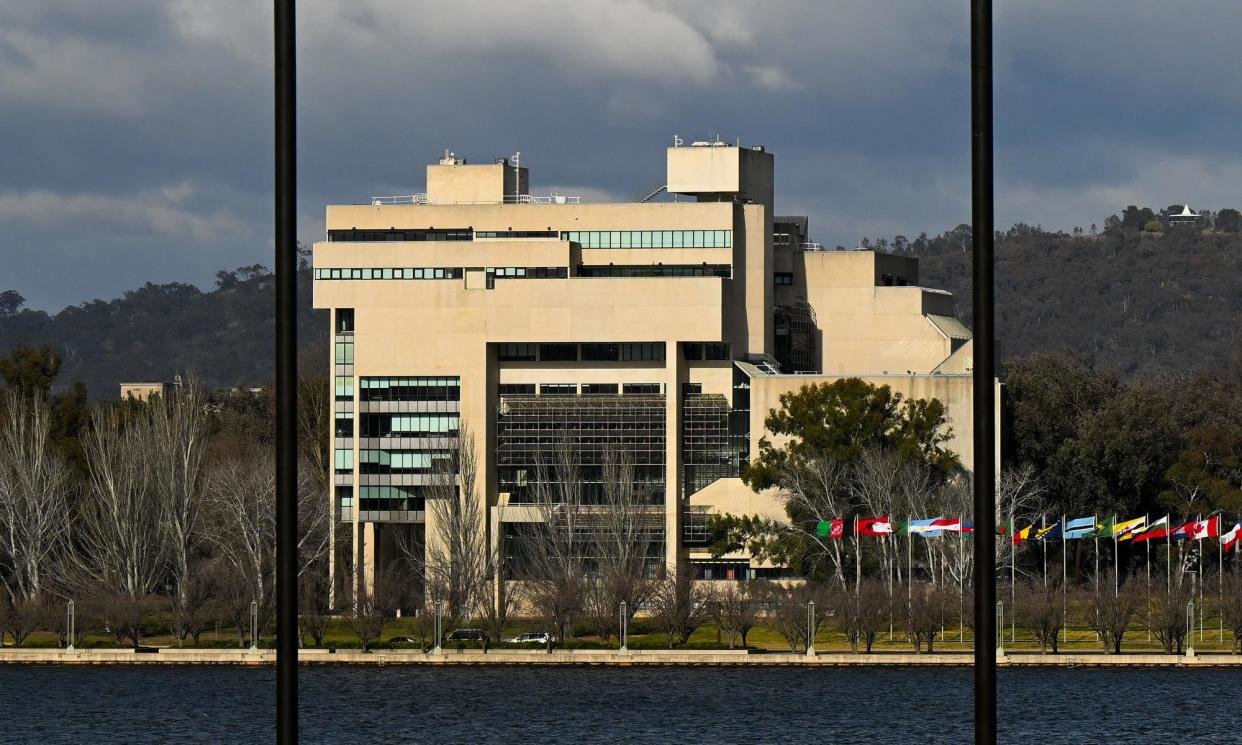Asylum seekers with unfounded fears would have right to release if Australia loses case, high court told

Asylum seekers would have a “constitutional right” to be released from immigration detention even if their fears are not well-founded, if the commonwealth loses a landmark case, the high court has been told.
The solicitor general, Stephen Donaghue, on Wednesday also warned the high court that ruling indefinite detention unlawful even where detainees refuse to cooperate in deportation would “turn the federal circuit court into the refugee tribunal”, requiring it to relitigate protection claims that had already been rejected.
The high court is hearing the appeal of ASF17, a bisexual man who refuses to return to Iran, where sex between men is illegal and can attract the death penalty. He remains in immigration detention because he cannot be deported to Iran, which does not accept involuntary deportees.
Related: Hundreds more immigration detainees could be released in sequel to NZYQ high court ruling
In November the high court ruled in the NZYQ case that indefinite detention is unlawful where there is “no real prospect of removal becoming practicable in the reasonably foreseeable future”.
Despite releasing 152 people as a result of that decision, the commonwealth believes it is not required to release people whose lack of cooperation is a factor in their inability to be deported.
In January, Justice Craig Colvin rejected ASF17’s application for release, finding that he was not refusing to cooperate due to a “genuine subjective fear of harm if [he is] removed to Iran”.
Colvin said that “all voluntary actions” to assist are relevant to the test of whether deportation is possible, even where “the detainee is refusing to undertake those actions” due to a “genuine subjective fear of harm” if deported.
In Wednesday’s hearing, Justice James Edelman distilled the applicant’s case down to two points: whether a detainee who refuses “for any reason … to be removed anywhere” must be released; and, if cooperation does matter, whether the detainee must be released if they have a “good reason” for refusing removal.
Lawyers for ASF17 and AZC20, another Iranian asylum seeker granted leave to intervene, submitted that there is “no duty” of detainees to cooperate with deportation in the Migration Act.
In March the Albanese government attempted to introduce such an obligation in its deportation bill, which is currently stalled before a Senate inquiry to report in May.
On Wednesday the parliamentary human rights committee, chaired by Labor MP Josh Burns, criticised the bill, warning that mandatory minimum sentences of one year in prison for refusing to cooperate with deportation was “incompatible with the rights to liberty and to a fair trial”.
The committee recommended extensive amendments including removing mandatory minimums and the power for the immigration minister to add visa classes to those who can be ordered to cooperate with deportation.
In the high court Lisa De Ferrari SC, ASF17’s counsel, rejected earlier findings that her client wanted to remain in Australia for economic opportunity.
De Ferrari argued that her client remained in detention despite it being clear since late 2018 there was no prospect he would agree to be deported because the commonwealth had effectively interpreted its duty to deport him as “removal to Iran”.
No approaches were made to third countries such as Australia’s Five Eyes allies, as had occurred for NZYQ, she said.
De Ferrari noted that in the federal court ASF17 had said he would be prepared to go anywhere, including the high seas where he was picked up.
ASF17 had even challenged the commonwealth to “take me to Gaza” and under cross-examination insisted this wasn’t a rhetorical flourish because he had a better chance of survival there than Iran.
Donaghue submitted that it “doesn’t matter” that the commonwealth hadn’t tried to send ASF17 elsewhere, because its case was solely that he could be deported to Iran.
Donaghue said the commonwealth did consider prospects of third country removal, but it didn’t have any basis for thinking any other countries would accept ASF17, a citizen of Iran. He noted the federal court found there was “no third country to which he could be removed”.
Donaghue also cited the risk of “diplomatic tension” with the third country and the “risk of refoulement” to their home country if the asylum seeker has “no right to stay” in countries “we effectively dumped them”.
Earlier, judges were sceptical of the proposition that immigration detainees’ refusal to cooperate rendered their detention punitive.
Justice Jacqueline Gleeson suggested this would mean that “any detainee could manipulate the system by rejecting a removal”.
The chief justice, Stephen Gageler, suggested this meant that “someone who is completely obtuse has a better case” to be released “than someone who can be reasonable”.
Related: Indefinite immigration detention ruled unlawful in landmark Australian high court decision
Craig Lenehan SC, counsel for AZC20 who also represented NZYQ, accepted that an “intransigent” detainee who it “can be predicted will be intransigent into the future” will have to be released.
Lenehan faced a barrage of questions about what would constitute a “good reason” to resist removal, and how courts could decide such factual questions. He submitted that mental incapacity and genuine fear would both be a “good reason” to refuse to cooperate with removal.
Donaghue said asylum seekers often have a genuine fear that is nevertheless not well founded.
He said the commonwealth should be able to detain people “who it would be practicable to remove” if they cooperate and the detainees “are capable of cooperating with that removal” but they nevertheless refuse.
Donaghue argued that practicality of deportation had nothing to do with whether detainees’ reasons were “good or bad” but rather how strongly they held them.
In March Guardian Australia revealed that the government has identified more than 170 people in immigration detention who may have to be released if it loses the ASF17 case.


